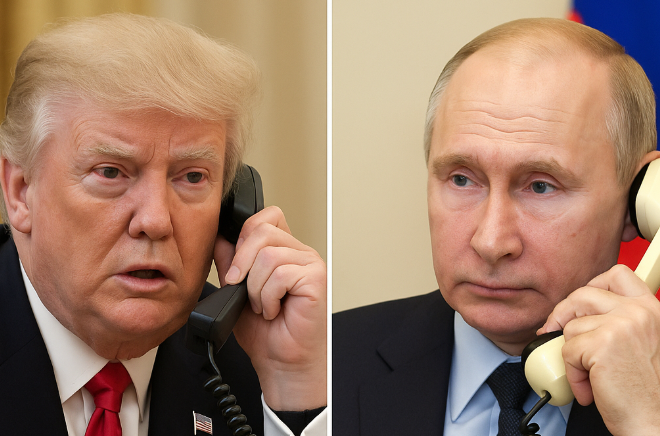
In a major diplomatic development, U.S. President Donald Trump announced that Russia and Ukraine will immediately begin peace negotiations following a two-hour phone conversation with Russian President Vladimir Putin. Despite Putin's refusal to commit to an unconditional ceasefire, Trump described the discussion as a breakthrough.
Posting on his Truth Social platform, Trump wrote, "I believe it went very well. Russia and Ukraine will immediately start negotiations towards a ceasefire and more importantly an end to the war." Speaking later to reporters in the Oval Office, Trump said he believed Putin was ready for a ceasefire.
When asked if he referenced his previous Truth Social post urging Putin to stop the war with the words “Vladimir, stop,” Trump said he did not bring it up. However, he noted, “I did say it’s time. You’ve got to stop this thing. And I believe he wants to stop.”
The Russian side echoed a cautiously positive tone. Speaking to Russian media, President Putin described the call as “very informative, very open, and overall very useful.” He stated that Russia was ready to engage with Ukraine on drafting a memorandum toward ending the war. This would include principles of settlement, terms of a peace agreement, and the possibility of a temporary ceasefire, provided the right agreements are reached.
Putin also emphasized the need for both Moscow and Kiev to show maximum effort to reach compromises suitable to all parties. However, the Kremlin confirmed that no timeline for a ceasefire was discussed during the call. Kremlin aide Yuri Ushakov added that Trump and Putin both support an in-person meeting and have assigned their respective teams to begin preparations, though no venue has been finalized.
Ukrainian President Volodymyr Zelensky spoke with Trump before and after the Putin call, urging him not to make any decisions about Ukraine without Kiev’s involvement. “For us, these are matters of principle and very important,” Zelensky said. He also called for tougher sanctions against Russia if it refuses to agree to a ceasefire. Zelensky firmly rejected any withdrawal of Ukrainian forces from eastern and southern regions under Kiev’s control, pushing back against Russia’s conditions for ending its invasion.
Following the Trump-Putin conversation, European nations reiterated their support for Kiev, backing Zelensky’s call for increased sanctions on Moscow if progress toward a ceasefire stalls.
Trump also spoke with several Western leaders after his call with Putin, including European Commission President Ursula von der Leyen and the leaders of France, Germany, Italy, and Finland.
One notable development was the suggestion that the Vatican could host the potential peace talks. Trump, along with Italian Prime Minister Giorgia Meloni, indicated that Pope Leo XIV had offered to host the negotiations, although the Vatican has not officially confirmed the offer. “I think it would be great to have it at the Vatican. Maybe it would have some extra significance,” Trump said.
Defense analyst Lt. Col. Daniel Davis offered a nuanced view on the situation, noting that Trump appeared far more optimistic than Putin. Davis reminded observers that Russia’s conditions for ending the war have remained unchanged since June of the previous year, when Putin laid out a clear and uncompromising roadmap for total cessation of the conflict — not just a ceasefire.
“The Russian side has not changed at all since before Trump came into office,” Davis explained. “They didn't change before this call. They didn't change after this call.”
While the tone of diplomacy has improved, the path to lasting peace remains fraught with challenges. The world now watches to see whether these initial talks will lead to meaningful results or fall into the pattern of failed negotiations.




